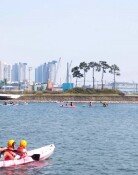Nat`l Assembly should scrutinize super-sized budget for economy boosting
Nat`l Assembly should scrutinize super-sized budget for economy boosting
Posted September. 19, 2014 04:47,
The government has announced a 376 trillion won budget (about 361 billion U.S. dollars) for next year. The planned total expenditure is expanded by 20 trillion won (19.24 billion dollars), or 5.7 percent, the largest increase in seven years. The amount of fiscal deficit has also increased to 33.6 trillion won (32.32 billion dollars). The budget plan includes many policies supporting President Park Geun-hye`s campaign promises including welfare and job creation. The welfare budget totals 115.5 trillion won (111.1 billion dollars), exceeding 30 percent of the total budget for the first time.
At a time when the domestic economy is stuck in a slump while the United States, Japan and Europeans countries are expanding spending, it is necessary for Seoul to try to reinvigorate the economy through fiscal expansion. With no election scheduled in 2015, next year is the golden opportunity for the government to fully concentrate on the economy.
The president`s promise to achieve a balanced budget by 2017 is unlikely to be met. It is almost impossible for the Park administration to strike a budget balance before its term ends. Korea`s state liabilities will increase to 570.1 trillion won (548.3 billion won) next year, accounting for 35.7 percent of the nation`s gross domestic product. The government has to issue bonds to repay the increasing state debts, adding burdens to future generations. If it fails to revive the economy despite the heavily increased spending, it could end up emptying the state coffers.
The government estimated the budget and the size of the fiscal deficit on the assumption of a 4 percent real economic growth rate. Last year, the government set its economic growth target at 3.9 percent for this year. In reality, however, the rate seems to be unlikely to reach 3.7 percent, resulting in an estimated shortage of 8 to 9 trillion won (7.69 billion to 8.66 billion dollars) in tax revenues. If next year`s growth rate fails to meet expectations, the fiscal deficit will grow even larger.
It is questionable that the government has to stick to the president`s campaign promise to halve university tuitions. Unlike the previous Lee Myung-bak administration, the Park administration promised not to try to boost the economy through large-scale construction projects. However, the government has increased infrastructure building budget to 22.7 trillion won (21.83 billion dollars) in next year`s budget. It also set aside 1.1 trillion won (1.06 billion dollars) more in the budget for job creation than in 2014. Instead of being bent on expanding fiscal expenditures, the government should see to it that the spending plans will produce policy effects. It is the National Assembly`s job.
Creating a virtuous circle of fiscal expansion reinvigorating the economy and increasing tax revenues depends on how much vigor it will give to the private sector. The current political situation is stuck in a deadlock due to controversies over a special bill on the sunken ferry Sewol, preventing other economy-related bills from passing through the parliament. Under current law, next year`s budget bill will be automatically introduced to the main parliamentary session on December 2. However, there is no guarantee that the bill will be approved. The president should show her leadership and the political circles should display the spirit of compromise in order to revive the economy.







